I-TECH is currently selecting participants for a new, innovative program designed to strengthen the leadership and management skills of clinical and public health laboratory supervisors.
Category: Health Systems Strengthening
Latest News from I-TECH Ethiopia
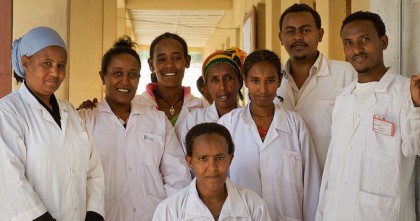
Overview of I-TECH Ethiopia
Since 2003, I-TECH Ethiopia has been working with the Federal Ministry of Health, Federal HIV/AID Program Coordinating Office, Regional Health Bureaus, civil society and other partners to provide technical assistance to support the knowledge, capacity, and skills of health care workers and improve Ethiopia’s health care systems.
I-TECH works primarily in the three northern regions of the country, Afar, Amhara, and Tigray, to support comprehensive HIV and AIDS programs and health systems strengthening in 60 health facilities (36 hospitals and 24 health centers) plus four regional laboratories. Together, these regions account for nearly 40% of the national HIV burden. Originally, I-TECH’s work focused on increasing access to HIV treatment and care, and on preparing health care workers to face the challenges associated with the epidemic. Increasingly, I-TECH is expanding this work to focus on a wide-reaching portfolio of health programs. These efforts are designed for sustainable transition to local ownership — allowing them to become an enduring part of the national health care system.
Updates
Integration of Mental Health and HIV Services
People living with HIV (PLHIV) are at higher risk for mental health problems which affects their health and quality of life. Mental health problems are more than twice as common among PLHIV then the general population. This may be even higher in communities where stigma and discrimination are rampant. In addition mental health services are limited in Ethiopia.
I-TECH Ethiopia has been strengthening the national mental health integration initiative. Specifically, in collaboration with the Ethiopian Regional Health Bureaus in Amhara, and Tigray and the Regional Networks of HIV Positive People, I-TECH initiated a pilot project for mental health integration through screening and management of common mental health conditions by using a task shifting approach since December 2012. ART clinicians and case managers have been trained on screening for mental health condition using a pre-tested simple screening tool adapted by I-TECH at four hospitals in Amhara and Tigray regions. The goal of the project is not only to provide comprehensive health services to PLHIV but to also improve adherence to care and treatment.
Debra Brehan Referral Lab Launch
The Debra Brehan Referral Hospital Laboratory was inaugurated on Sunday, June 16th by the US Ambassador to Ethiopia, Ambassador Donald Booth; Ethiopian State Minister, Dr. Amir Aman and Amhara National Regional State Vice President and Educational Bureau Head, Binalf Andualem. The laboratory was renovated and equipped by I-TECH Ethiopia with funds from the US government and the President’s Emergency Plan for AIDS Relief (PEPFAR) as well through partnership with the Amhara Regional Health Bureau and the Debra Brehan Hospital.
The laboratory was built to international standards to provide high quality laboratory tests and services to the Debra Brehan Referral Hospital and can service 450 patients per day. It provides referral testing services to 3 rural hospitals and 86 health centers in the region. The laboratory is equipped to perform different lab test such as microbiology, parasitology, blood culture, TB diagnosis, HIV testing as well as clinical care test for HIV positive patients such as blood chemistry, hematology and CD4 cell count for monitoring antiretroviral therapy. The laboratory will also serve as a sub regional referral laboratory for providing external quality assessments of other laboratories in the region.
In addition to this, this laboratory will also serve the region as a training site for the laboratory staff practicing in hospitals and health centers as well as for university students studying laboratory medicine.
Improvements to Blood Safety in Ethiopia
Blood safety ensures that everyone has access to blood and blood products that are safe, available, accessible and adequate to meet the needs of patients, transfused only when necessary, and provided as part of a sustainable blood program within the existing health care system. In Ethiopia the responsibility to meet the blood needs falls on the National Blood Transfusion Service (NBTS) and hospitals. A lot of blood is collected at transfusion hospitals, which are outside of the NBTS. Safe amount of blood supplies are inadequate in the transfusion hospitals to meet the health burdens of the Ethiopian society. This unmet need for blood has created a gap that is unregulated and fragmented. It has resulted in commercial collections and family replacement donations, which are of increased risk of transfusion transmissible infections.
I-TECH Ethiopia has been working to strengthen the national blood safety program in Ethiopia in collaboration with the Federal Ministry of Health. Most recently I-TECH supported training on blood donation and quality assurance for laboratories for blood safety. As well I-TECH supported training for community members to encourage volunteers for blood donation.
I-TECH will continue to work with the Amhara, Afar the Tigray Regional Health Bureaus to improve the health system to ensure a safe blood supply to the hospitals.
Five Questions For Misti McDowell, I-TECH Ethiopia Country Director
Editor’s Note: This is a first in an occasional series featuring I-TECH staff.
Misti McDowell joined I-TECH Ethiopia in February, assuming leadership of I-TECH’s largest country program. In Ethiopia, I-TECH’s work is primarily in the Amhara, Afar, and Tigray regions, which account for nearly 50% of the national HIV burden. I-TECH is focused on strengthening the country’s public health systems, including hospitals and health centers, laboratories, public universities and medical schools. Prior to joining I-TECH, McDowell worked for five years in Dhaka, Bangladesh, for FHI360 where she oversaw projects on HIV/AIDS, nutrition, family planning, TB, hospital accreditation, and neglected tropical diseases.
 You just became the Country Director for I-TECH Ethiopia. What has been the biggest surprise in your first few weeks at I-TECH?
You just became the Country Director for I-TECH Ethiopia. What has been the biggest surprise in your first few weeks at I-TECH?
I wouldn’t say that it is a surprise, but I was very impressed with the quality of work that I-TECH has accomplished over the years in Ethiopia, especially around all the infrastructural upgrades to hospitals and universities, the capacity building and training to providers delivering quality HIV care, treatment to patients, and strengthening universities to deliver comprehensive pre-service and in-service training.
What will your primary focus be over the next 18 months?
My primary focus will be to diversify funds, build a stronger team, and improve morale. I think with a stronger team we can accomplish more than we already have and continue to make a greater impact in the health care system of Ethiopia.
Tell us about a leader who inspires you.
Dalai Lama: “If you think you are too small to make a different, try sleeping with a mosquito.”
You have brought your family to Ethiopia, including your husband and two young girls. What do your girls like best about their new life in Addis?
I think what my girls love best about Addis is the mountains and that they can go hiking and rock climbing.
What’s the most interesting challenge you think I-TECH’s programs are tackling in Ethiopia?
The transition of programs to the government with a quick timeline. I think the government of Ethiopia really wants to have everything transitioned; however with the planned timeline, it will be difficult to transition everything and maintain quality. There are many systems in the government that need to be streamlined to ensure sustainability and quality of the programs that are now being supported by NGOs and to change those systems will take a long time.
New Article On Cost Effectiveness Of Training
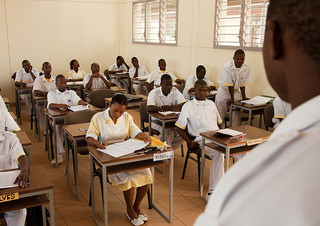 A new article on cost-effectiveness analysis of global training programs has been published in a leading journal on health workforce issues.
A new article on cost-effectiveness analysis of global training programs has been published in a leading journal on health workforce issues.
The article, “Cost-Effectiveness Analyses of Training: A Manager’s Guide,” was written by two I-TECH faculty: Gabrielle O’Malley, who is I-TECH’s Director of Operations Research and Quality Improvement, and Marcia Weaver, a Research Associate Professor based at I-TECH. Elliot Marseille of Health Strategies International in San Francisco also contributed to the article that appears in the journal Human Resources for Health.
The evidence on the cost and cost-effectiveness of global training programs is sparse. O’Malley and Weaver wrote this manager’s guide for professionals who want to recognize and encourage high quality cost-effectiveness analysis.
Weaver credits O’Malley with coming up with the idea for the article and spearheading it through several drafts over several years. In her role at I-TECH, O’Malley participates in meetings with policymakers and sees how compelling evidence on cost-effectiveness can be as well as the potential for cost data to be misinterpreted or misused.
“The objectives of the article are to promote professional standards for cost analyses and cost-effectiveness and show it’s feasible to provide evidence within the scope and budget of a training program evaluation,” Weaver said.
Photo of the Week: Clinical Mentors
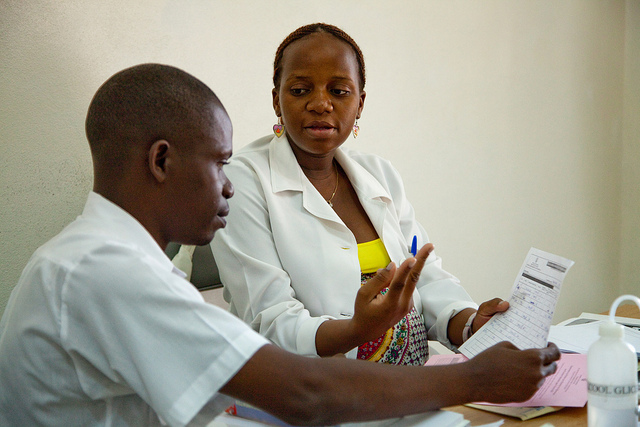
I-TECH clinical mentors work to strengthen the provision of care for people living with HIV and AIDS, tuberculosis (TB), and sexually transmitted infections (STI) by assessing and making recommendations for improvements to service-delivery systems.
I-TECH Releases Updated Manual on Essential Supervisory Skills
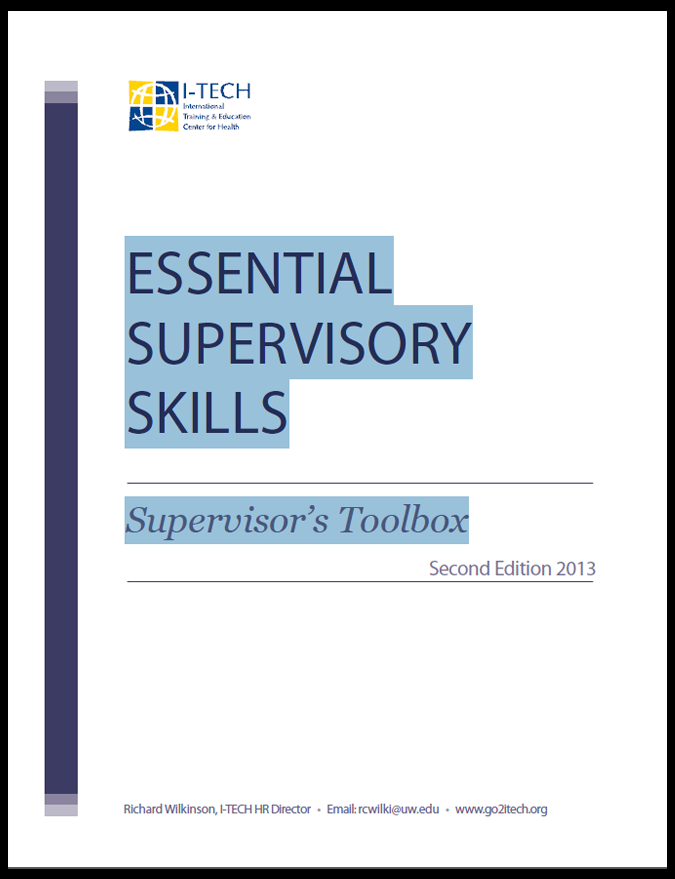 The International Training and Education Center for Health (I-TECH) is pleased to announce the release of the second edition of I-TECH’s manual Essential Supervisory Skills, which you can download here (PDF, 2.7 MB).
The International Training and Education Center for Health (I-TECH) is pleased to announce the release of the second edition of I-TECH’s manual Essential Supervisory Skills, which you can download here (PDF, 2.7 MB).
A resource for managers, this “supervisor’s toolbox” is a 65-page manual developed from years of research and discussions with supervisors in a variety of industries from several countries. This easy-to-use guide gives managers a step-by-step plan to develop their supervisory skills while helping their employees reach their potential. Seven chapters include background and instructions on accountability, evaluation, effective hiring and how to address performance issues.
“The purpose of the Supervisor’s Toolbox is to provide a convenient resource supervisors can turn to when dealing with the myriad of issues that come their way,” said Richard Wilkinson, I-TECH Human Resources Director.
Decisions supervisors make often have a direct impact on employees’ lives—and global health. Wilkinson points out that investing in training for supervisors translates to more effective, efficient, and happier employees.
“There’s an old saying that employees join organizations and leave bosses,” he said. “Supervisors directly affect the difference employees can make in contributing to the success of their teams and I-TECH. My hope is these tools will help supervisors communicate clearly and manage confidently.”
I-TECH South Africa Co-Hosts Third National Regional Training Centre Conference
Every biennium, the South African National Department of Health hosts a National Regional Training Center (RTC) Conference that brings together RTC managers, their line management, as well as key policy makers from the National and Provincial Departments of Health.This year I-TECH South Africa was honored to serve as a co-host.
This was the third national conference, and this year the theme was A Decade of Strengthening the Health Care System: Developing Human Resources for Health through the Regional Training Centers.
The popular conference registered 137 delegates out of the expected 120. Public health experts delivered compelling talks, whose topics ranged from leadership and management to innovative ways of delivering training.
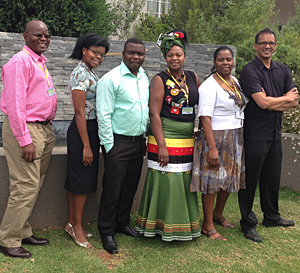
I-TECH South Africa presented a talk on The Findings of the Situational Analysis in Nine Regional Training Centres of South Africa, as well as a report on Regional Training Center Models, which was authored by Dr Nathan Linsk, a professor at the Jane Addams College of Social Work at the University of Illinois at Chicago, who drew on his 25 years experience with the US AIDS Education and Training Centers network. Both of these reports contributed significantly to the subsequent three days of discussion about the future of Regional Training Centers in South Africa.
During the conference, delegates were divided into five commission that looked at:
- Future role (Coordination of all in-service training; Institutional Base, Location, Funding model)
- Resources for RTCs (Human, IT, Internet connectivity, Equipment, Infrastructure etc.)
- Training and Education Approach (Mentoring, distance learning and Resource Library)
- Coordination, Accreditation and linkages with academic institutions (levels of accreditation, certification etc.)
- Planning, M & E, Reporting (Training needs analysis, integrated planning, M & E systems)
RTC managers took the worksheets from the 5 Commissions and developed an action plan, which was presented by the National Department of Health in a plenary session. As part of the next steps, I-TECH South Africa and NDOH will write a Conference report that will contain the action plan and a monitoring and evaluation plan as attachments. The NDOH will present the action plan to the National Health Council, made up of the National and Provincial Ministers of Health, for high level decisions and support toward the implementation of the proposed model.
Zimbabwe: I-TECH Launches Circumcision Program
I-TECH Zimbabwe’s male circumcision program was inaugurated this month by our local partner, the Zimbabwe Association of Church-Related Hospitals (ZACH), with completion of 16 surgeries at the Tshelanyemba Mission Hospital in Gwanda District in the Southern Province.
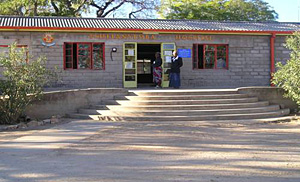
“Today is a milestone for our male circumcision program in Zimbabwe,” said Esther Machakaire, CDC-Zimbabwe Biomedical HIV Prevention Advisor who is providing technical assistance to I-TECH and ZACH to implement male circumcision services. “We expect the numbers to keep growing. I am confident that together we will make the I-TECH/ZACH/CDC male circumcision program a huge success!”
Male circumcision performed by well-trained medical professionals is an evidenced-based public health intervention to reduce the risk of men acquiring HIV/AIDs through female-to-male transmission. Scale up of male circumcision services is an important part of the combination prevention strategy developed by the Zimbabwe Ministry of Health and Child Welfare (MOHCW) to decrease HIV incidence among adults.
The I-TECH/ZACH male circumcision program is supported by CDC and MOHCW, and has plans to rapidly scale up services at 10 sites in 10 of Zimbabwe’s 62 districts, with the goal of conducting 16,000 surgeries by September 2013. It follows the model of similar safe male circumcision programs that have been implemented by I-TECH in Botswana and Malawi. The program includes assessment of site readiness to implement services, training of medical professionals in safe circumcision, procurement of medical supplies and equipment, close monitoring of quality control and quality assurance, and community outreach for demand creation.
Ethiopia: New Regional Lab in Afar Launched
Report by Yonathan Alemu, I-TECH Ethiopia
A new regional referral health and research laboratory in Afar regional state, in Semera was inaugurated on February 9, 2013. The regional laboratory was renovated and established by I-TECH through partnership with the Ethiopian Health and Nutrition Research Institute (EHNRI) and collaboration with the Afar Regional Health Bureau and funded by the U.S. President’s Emergency Plan for AIDS Relief (PEPFAR) through the United States Centers for Disease Control and Prevention (CDC).
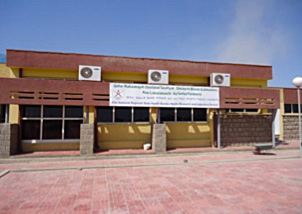
The new regional health facility, which is well equipped with advanced laboratory diagnostic technologies, was handed over to the Regional State with eventful program that brought together high level officials from the Federal Ministry of Health, the Afar regional state, the EHNRI, Afar regional health bureau and I-TECH Ethiopia leadership team.
The Afar regional Health Bureau Head, and the EHNRI regional laboratory capacity building directorate, Director addressed the impacts of partnership/collaboration to the improvement of the health system in the country in general and in the Afar region in particular and also applauded the I-TECH-Ethiopia’s significant contribution in strengthening the laboratory system in the Afar region.
The health facilities in the Afar region were small in number and were not well developed to provide standard and quality laboratory diagnosis services for the highly prevalent and deadliest diseases, but this is now changing following the intensified national health system strengthening programs in the country.
Dr. Nega G/yesus, the acting country Director of I-TECH Ethiopia acknowledged the long years of collaboration and partnership efforts put up by partners and the regional health bureau for all the successes achieved and appreciated the unwavering support of the United States Government in the health sector development in Ethiopia.
This new regional referral health laboratory will be a center to systematically build capacities of laboratories in the region to improve, assure and maintain quality laboratory diagnostic services. Moreover, it strengthens the regional referral system that would significantly improve the diagnostic capacities of laboratories for such as, HIV/AIDS, Malaria, TB, STIs and other opportunistic and tropical diseases, playing an integral role in Ethiopia’s public health emergency response system.
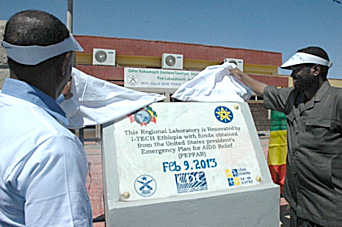 Dr. Wubshet Mamo, I-TECH Ethiopia’s Laboratory Program Director said, “The goal of the PEPFAR laboratory program is to support countries implement laboratory services in a sustainable manner to provide quality diagnostic tests, strengthen integrated laboratory systems and support and/or establish country or regional laboratory institutions. Establishing this modern laboratory, which is the 1st in the Afar regional state and the 9th regional referral health laboratory in the country will play a substantial role in changing the region’s laboratory diagnostic service quality, ensuring accurate and reliable laboratory test results that every patient deserves to get.”
Dr. Wubshet Mamo, I-TECH Ethiopia’s Laboratory Program Director said, “The goal of the PEPFAR laboratory program is to support countries implement laboratory services in a sustainable manner to provide quality diagnostic tests, strengthen integrated laboratory systems and support and/or establish country or regional laboratory institutions. Establishing this modern laboratory, which is the 1st in the Afar regional state and the 9th regional referral health laboratory in the country will play a substantial role in changing the region’s laboratory diagnostic service quality, ensuring accurate and reliable laboratory test results that every patient deserves to get.”
He further explained that the role of this regional laboratory primarily will be assuring the quality of laboratory services through conducting external quality assessment, providing referral testing services and strengthening the referral system, supporting in skill building of laboratory professionals, conducting disease surveillance and taking appropriate measures in case of emerging infections in the region. This laboratory will also be a hub for evidence-based interventions (operational health research). More importantly, supporting laboratories in the region to improve their laboratory quality system towards the WHO-AFRO step-wise laboratory accreditation will be another key role of this regional laboratory facility, said Dr Mamo.
The establishment of this Regional Referral Health Laboratory will have significant impact in building the capacities of the hospitals and health centers in the Afar region to provide standardized and quality laboratory services to the people in the region.
If there is one reason that shines the glowing happiness of the local leaders over the scorching sun during the event; it is the anticipated reduction in referrals to distant cities for a better laboratory diagnosis.
Ivoirian OpenELIS Software Developers Build Skills In Seattle
The weather has been rainy, and the midwinter days are short, but for two software developers from Côte D’Ivoire, four mid-winter weeks in Seattle offer a rare chance to develop skills under the close mentorship of University of Washington I-TECH experts.
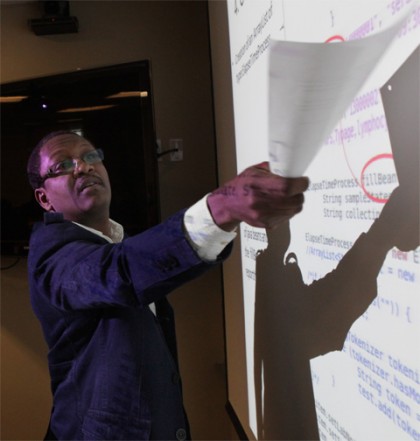
“There is no opportunity in Côte D’Ivoire to build software development skills like this,” said Dr Constant Kone on a recent afternoon as the grey Seattle rain pelted against the window of his borrowed office at I-TECH. His colleague Mr Kamalan Fourier, typing intently on his laptop across the table they share, nodded in agreement.
For several years, I-TECH has coordinated the implementation of the OpenELIS software in national public health laboratories in Côte D’Ivoire, an effort that is led by a highly skilled UW-based health informatics team. The open source laboratory informatics software was customized by the I-TECH team to match the workflow and local needs in Côte D’Ivoire.
But after the initial push to develop and install the software, there was a need for ongoing support, bug fixes, and additional features. “We get continual requests to add new features,” says Jen Antilla, a training specialist on the Seattle team, “for example to respond to new lab processes or build new reports that users need. And like any software, there will always be bugs to fix. We want to build the capacity to respond to those requests locally, in the labs where OpenELIS is running.”

Like all I-TECH programs, the Côte D’Ivoire deployment of Open ELIS is on a trajectory towards local ownership and sustainability, but that path is made more complicated by the lack of skilled software developers in Côte D’Ivoire. I-TECH began recruiting for local software developers in April 2012, and recognizing that most applicants would require additional training, the team started designing a custom training course to build the Open ELIS development skills of the new hires in Côte D’Ivoire.
As the first trainees, Dr Kone and Mr Fourier are in Seattle for four weeks, which is the intensive first phase of a planned nine month training program that will continue remotely after they return home.
Central to the training is a problem-based curriculum developed by Antilla and her colleagues, which moves the learners through a typical software development cycle: gathering requirements, designing the solution, developing it into the Open ELIS codebase, and testing it before implementation.

“It gives them the opportunity to learn about the different facets of Open ELIS as well as the tools and process needed to build a new feature,” says Antilla. “And to do so under the direct guidance of a mentor who’s spending lots of face-to-face time with them. When they return to Côte D’Ivoire they will continue with similar exercises a few hours each week, under a remote mentorship of our team, for the next 8 months.”
In the next few months Open ELIS will be fully implemented at a new site in Côte D’Ivoire, the lab at the Institut Pasteur. For the first time there will be local developers on-site with the skills to solve problems locally for their colleagues, with ever-decreasing support from Seattle.
And the I-TECH team in Seattle looks forward to having skilled colleagues at the point of deployment, sharing of the load.
“There’s nothing quite like having the opportunity to build a personal relationship over 4 weeks together in Seattle,” said Paul Schwartz, the senior software engineer on the Seattle team. “I look forward to working shoulder to shoulder with them after they return. Even when those shoulders are half a world away in West Africa!”
